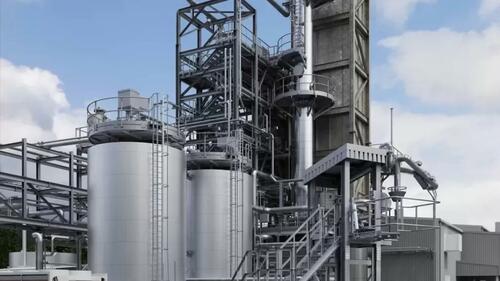Mura Technology Signs Offtake Agreement with Neste at first commercial-scale site in Teesside, Northeast England
Mura Technology, the global pioneer of a next generation advanced plastic recycling solution, has today announced the signing of a product offtake agreement with Neste.
Neste will convert ISCC PLUS accredited products from Mura’s first commercial-scale site in Teesside, Northeast England, into feedstock for the production of new plastics, replacing the need for fossil resources. This first site is set to commence operations mid-2024.
The agreement with Neste follows a previously announced offtake agreement with Dow, one of the largest global manufacturers of plastics.
Dr Steve Mahon, CEO of Mura Technology, said: We are delighted to be working with Neste to advance the transition to a circular plastic economy. Our technology, soon to be deployed in our first-of-its-kind UK facility, has unlocked new value in plastic waste streams previously considered to be unrecyclable. We look forward to working with the polymers industry around the world as we expand across the US, Europe, and Asia.
Heikki Färkkilä, Vice President Chemical Recycling at Neste, commented: Neste welcomes the ambitions and progress made by Mura and is looking forward to future cooperation between the two companies. At Neste, we will need increasing amounts of product derived from plastic waste and want to enable investments into the sector by providing a flexible offtake for our partners’ developing capacity. Murais helping provide scale to process large volumes of waste plastics into circular feedstocks to meet this demand.
Pioneered by Mura Technology, the HydroPRS™ process is the next generation of advanced plastic recycling due to its use of supercritical water (water under elevated pressure and temperature), which distinguishes it from alternative advanced recycling processes, such as pyrolysis, and ensuring the efficient and scalable conversion of plastic waste to hydrocarbons.
HydroPRS™ is able to process contaminated and mixed plastics, such as flexible and rigid food packaging, resulting in high yields of hydrocarbon products for use in the manufacture of virgin-quality, recycled plastics. Through this process, there is no limit to the number of times the same material can be recycled – meaning HydroPRS™ has the potential to significantly reduce the need for fossil resources in plastic production and permanently increase material circularity in the plastics industry.
By providing a route to recycle the hard to recycle materials, Mura has created a complementary process to operate alongside traditional mechanical recycling, as highlighted in the 2023 technical report by the European Commission’s Joint Research Centre (JRC)[i]. This report also benchmarked Mura’s HydroPRS™ as the best in class, c50% lower carbon footprint, compared to two pyrolysis technologies, helping end customers to meet their Net Zero targets.
[i] Environmental and Economic Assessment of Plastic Waste Recycling, Garcia-Gutierrez, P., Amadei, A.M., Klenert, D., Nessi, S., Tonini, D., Tosches, D., Ardente, F., Saveyn, H. European Commission, Joint Research Centre JRC Publications Repository – Environmental and economic assessment of plastic waste recycling (europa.eu)
Latest news
The joint venture between bp and Iberdrola España starts construction work on Spain's largest green hydrogen plant
This plant could create up to 500 new jobs during construction and approximately 25 Spanish companies will be involved
Power2X awards Worley contract for its eFuels Rotterdam project
Port of Rotterdam →Power2X contracted Worley, to provide engineering and project management services for its world-scale production facility for sustainable aviation fuel (e-SAF) and ultra-low carbon fuels at Rotterdam
Innovative plant to turn wood into biochemicals – UPM Biochemicals selects Bilfinger as maintenance partner for sustainable biorefinery
Leuna Chemical Complex →UPM Biochemicals’ innovative biorefinery uses unique process to produce biochemicals from sustainably sourced hardwood Bilfinger provides innovative, tailored full-service maintenance to enhance...
Repsol will invest more than €800 million in the Tarragona Ecoplant, a pioneering project in Europe to produce renewable methanol
Chemmed Cluster Tarragona →Repsol has approved a historic investment in the Spanish region of Catalonia to build the first plant in Europe to transform urban waste into renewable methanol - a fuel that will help decarbonize ...


